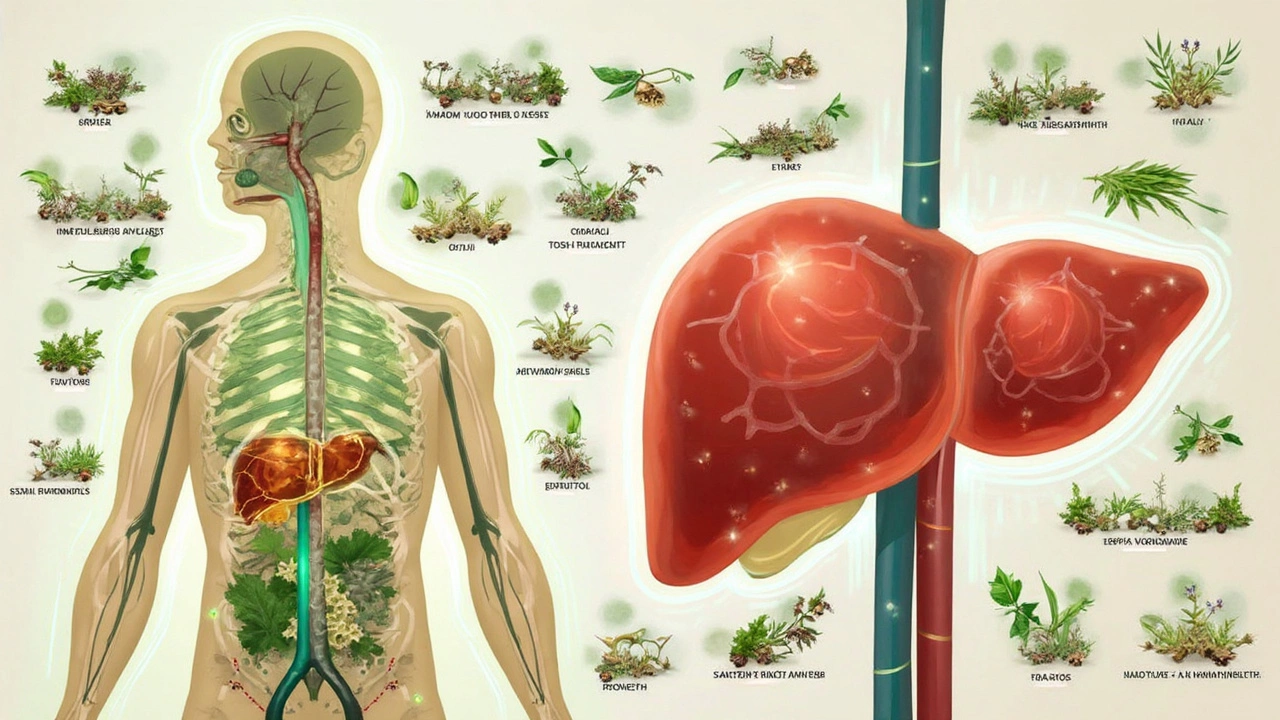Most people think 'natural' means 'safe,' especially when it comes to herbs. But that's not always true—your liver can have a tough time with certain herbal supplements. This organ is like your body’s chemical processing plant; everything you swallow, from tea to turmeric capsules, ends up passing through it.
If you load up on the wrong herbs, your liver has to work overtime filtering out the stuff your body can't use. This extra strain can sometimes trigger serious problems, even if you felt fine at first. A report from 2023 found that liver injuries from herbal supplements doubled over the last decade as more people turned to alternative medicine. So, it’s worth asking questions before adding that new herbal tea or capsule to your routine.
Before you try out a trending herb, or bump up your daily supplement dose, keep reading. You need clear facts—not hype—to avoid putting your liver at risk. Knowing which herbs to be careful with can save you from a lot of trouble down the road.
- Why the Liver Reacts to Herbs
- Common Herbs Linked to Liver Problems
- How to Spot Liver Toxicity Early
- Safe Use Tips for Herbal Supplements
- When to See a Doctor
Why the Liver Reacts to Herbs
Your liver is basically your body's detox center. It deals with everything you eat, drink, or swallow, including herbal stuff. When it spots something strange or hard to break down, it kicks into overdrive trying to process and get rid of it. This is where problems can start.
Some herbs contain natural chemicals that can be tough on the liver—especially if you take high doses, use them for a long time, or combine a bunch of different supplements. Even though the label might say "all natural," some herbs can trigger the same types of liver stress as medications or alcohol. Forget the myth that plants can't hurt you—your liver works just as hard breaking down a plant compound as it does with anything else.
"Herbal and dietary supplements account for up to 20% of liver injuries in the United States," says Dr. Victor Navarro, hepatologist at the National Institute of Diabetes and Digestive and Kidney Diseases.
The way your body handles herbs mostly comes down to liver enzymes. These enzymes act like little workers processing the stuff you swallow into safer, easier-to-remove byproducts. Trouble is, some herbs mess with these enzymes—either slowing down their work or clogging up the system so things back up. That’s when liver cells can get damaged or inflamed.
| Herb Example | Risk Level (High/Medium/Low) | Main Concern |
|---|---|---|
| Kava | High | Liver toxicity reported with regular use |
| Green Tea Extract | Medium | High doses linked to liver inflammation |
| Black Cohosh | Medium | Potential for rare liver injury |
Liver reactions can sneak up on you. Sometimes, you might not notice anything until your skin looks yellow or you start feeling sick for no obvious reason. That’s why it’s smart to treat liver toxicity from herbs as a real risk—not just a scare tactic. If you’re on any medications or already have liver issues, the chances of running into problems go way up. And don’t forget: the more supplements you mix together, the more your liver has to handle all at once.
Common Herbs Linked to Liver Problems
It's easy to assume that herbs from your local health shop are harmless, but a few are notorious for causing trouble with liver health. Let's talk about the ones that research and doctors actually warn people about—these aren't just rumors.
Liver toxicity from herbs is real, and here are some names that keep popping up in medical reports:
- Kava: Often used for anxiety and stress, kava has been tied to serious liver damage, from mild inflammation to even liver failure. Countries like Germany and Canada have already banned kava products after hospitalizations and deaths.
- Green Tea Extract (in high doses): The tea itself is usually fine, but supplements packed with green tea extract have triggered cases of hepatitis and even liver failure, especially when people chase quick weight loss goals.
- Black Cohosh: Marketed to ease menopause symptoms, black cohosh has been reported to cause hepatitis and serious liver injury. Not everyone is affected, but the risks are enough for some doctors to warn against it in people with liver conditions.
- Chaparral: Found in some detox teas, chaparral has a long history of causing jaundice and severe liver problems. It's banned in Canada and parts of Europe for this reason.
- Pennyroyal: Sometimes used for digestive troubles and to start periods, even small amounts can be toxic to the liver and cause permanent damage.
- Comfrey: Used in folk remedies for pain and wounds, comfrey contains pyrrolizidine alkaloids that are well-known liver toxins. Even topical comfrey creams have led to liver problems with long-term use.
In a 2022 statement, the American Liver Foundation put it bluntly:
"Just because a product is labeled as herbal or natural doesn’t mean it’s safe. The liver is often the organ that pays the price for unsafe supplements."
Don’t ignore these names just because they're plant-based or sold online. A simple web search on these herbs pulls up real-life warnings, not just in rare cases, but in patients worldwide.

How to Spot Liver Toxicity Early
It’s easy to miss early signs of liver problems, especially if you believe herbal supplements are harmless. The liver is quiet—when it’s in trouble, it won’t hurt until things get pretty bad. But if you watch for certain warning signals, you can catch problems before they do real damage.
Some of the first symptoms are subtle and easily mistaken for something else, like stress or a bug. Here’s what often shows up early when your liver’s under strain from herbs or supplements:
- Unusual tiredness – not just sleepy, like your body wants to shut down
- Nausea or loss of appetite that hangs around for days
- Yellowish skin or eyes (even a faint yellow can mean trouble)
- Dark pee or pale poop—this means the liver isn’t handling bile right
- Itchy skin with no rash
- Bloating or a weird feeling around your upper right belly, under your ribs
If you recently started a new herb or upped your dose and notice these signs, don’t brush them off. The sooner you stop the supplement and get checked, the better the odds your liver can bounce back.
Check out this quick table with common early symptoms and how often they show up in herbal supplement-related liver injuries, according to a 2022 clinical review:
| Symptom | Reported in Cases (%) |
|---|---|
| Fatigue | 70% |
| Nausea/No Appetite | 63% |
| Jaundice (Yellowing) | 47% |
| Dark Urine/Pale Stools | 44% |
| Abdominal Discomfort | 39% |
| Itching | 32% |
Don’t wait for all the symptoms to stack up. If anything on this list pops up and you’re taking herbal supplements, it’s smart to pause and call your doctor. Liver issues are much easier to turn around if you catch them early.
Safe Use Tips for Herbal Supplements
Staying safe with herbal supplements isn’t about luck—it’s about knowing what you’re getting into. Picking a random bottle off the shelf because a friend swears by it is risky, especially for your liver. Here’s how to protect yourself and make smarter choices:
- herbs can have side effects: Don’t fall for the ‘herbs are harmless’ myth. Some, like kava or comfrey, are linked to serious liver issues, especially if used for a long time or in high doses.
- Buy from trusted brands: Supplements aren’t as tightly regulated as regular meds. Look for brands that use third-party testing and clear labels. A “USP Verified” or “NSF Certified” badge is a good sign the product has what it claims—and nothing sketchy added in.
- Stick to recommended doses: More isn’t better. Going overboard just ups your risk for liver trouble. Always follow the package directions and avoid doubling up, even if you missed a day.
- Watch for weird combos: Check the ingredient list before you buy. Some blends hide risky herbs under fancy names or mix several together, raising the chance your liver won’t handle them well.
- Tell your doctor: If you take prescription meds, check in with your doc before adding a supplement. Some herbs mess with how drugs work, or pile extra stress on your liver.
- Cycle your use: Give your body breaks. Taking a supplement nonstop for months can wear your liver down, so try doing a few weeks on followed by a pause. This isn’t a magic bullet but helps reduce risk.
Read reviews, look for recall alerts, and check the FDA’s MedWatch site now and then for warnings about supplements. And remember—if a product promises wild results, like instant detox or miracle cures for your liver, that’s a red flag.

When to See a Doctor
Don’t wait for things to get really bad before you call your doctor. Sometimes, the earliest signs of liver problems show up quietly. If you’re taking herbal supplements and start feeling extra tired for no reason, that’s a red flag. Other common signs of liver issues from herbs can include nausea, dark urine, yellowish skin or eyes (that’s called jaundice), stomach pain, or even just losing your appetite out of nowhere.
If you notice any of these, don’t try to tough it out. Stop using your supplement right away and let a healthcare provider know what you’ve been taking. Bring the actual herbal product with you, since ingredients sometimes aren’t what you expect. This matters—a review published in 2023 showed over 15% of liver injury cases from herbs were actually caused by undisclosed ingredients in supplements.
- If you have a history of liver conditions, like fatty liver or hepatitis, you should always check with your doctor before starting any new herbal product.
- If your skin or the whites of your eyes look yellow, head to urgent care as this can signal serious liver injury.
- If you have dark pee, light-colored stools, or feel pain in the upper right part of your belly, these are warning signs.
| Symptom | Why It Matters |
|---|---|
| Jaundice (yellow skin/eyes) | Often a sign of major liver stress |
| Unexplained exhaustion | Can signal your liver isn't working right |
| Dark urine | Sometimes the earliest tip-off |
| Persistent nausea or vomiting | Liver might be inflamed or damaged |
| Confusion or mental fog | Dangerous sign of liver failure |
Remember, your liver health isn’t something you can just “walk off.” Even supposedly safe herbs can act up and cause real issues. If in doubt, get checked out—better safe than sorry. And if things feel off, especially after starting a new supplement, listen to your body and call someone who knows what to do.
